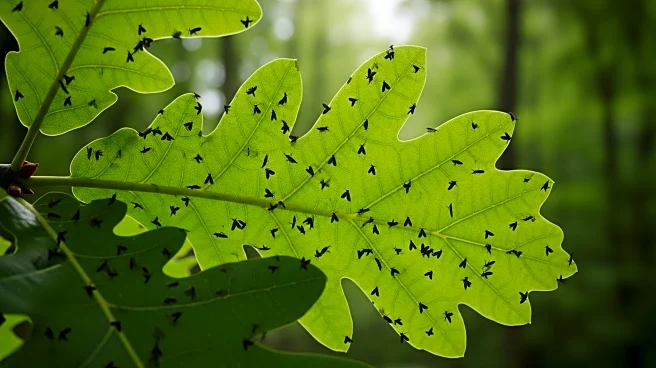What's Happening?
The Forestry Commission's efforts to control the spread of the oak processionary moth (OPM) in the UK through pesticide spraying have proven largely ineffective. Despite ongoing spraying since 2010, the invasive insect pest continues to spread rapidly across London and southern England. The use of pesticides, including deltamethrin, diflubenzuron, and Bacillus thuringiensis subsp. kurstaki (BTK), has not significantly slowed the spread of OPM. The spraying methods initially employed high-pressure, high-volume sprayers, which were later replaced by air-assisted electrostatic sprayers for better efficiency. However, the limitations of BTK, such as its susceptibility to UV light and rain, and the rapid re-foliation of oak trees during spring, have contributed to the failure in controlling OPM effectively.
Why It's Important?
The failure to control the spread of OPM has significant implications for the UK's forestry and urban environments. OPM poses a threat to oak trees, which are vital to the ecosystem and biodiversity. The continued spread of this pest could lead to increased costs for landowners who are legally required to manage OPM infestations. Additionally, the inefficacy of current pesticide strategies highlights the need for more effective pest control methods and could prompt a reevaluation of pest management policies. The situation underscores the importance of scientific knowledge and expertise in developing successful pest control strategies, which are crucial for protecting natural resources and maintaining ecological balance.
What's Next?
The Forestry Commission may need to explore alternative pest control strategies or enhance current methods to effectively manage OPM spread. This could involve investing in research to develop more resilient pesticides or adopting integrated pest management approaches that consider environmental factors and oak tree phenology. Stakeholders, including landowners and environmental groups, are likely to advocate for more sustainable and effective solutions. The ongoing challenge of OPM control may also lead to increased collaboration between government agencies, researchers, and industry experts to address the issue comprehensively.
Beyond the Headlines
The struggle to control OPM highlights broader challenges in pest management, including the reliance on chemical solutions and the need for ecological considerations in urban environments. The situation raises ethical questions about the environmental impact of pesticide use and the balance between human intervention and natural processes. Long-term, this could lead to shifts in how pest control is approached, with greater emphasis on sustainable practices and the integration of scientific research into policy-making.









